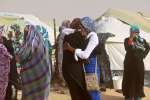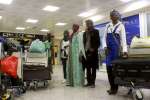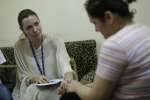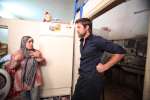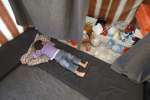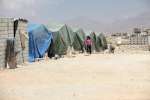- Text size
 |
|  |
|  |
| 
- Français
UNHCR urges Europe to do more to help Syrian refugees
News Stories, 11 July 2014
GENEVA, 11 July (UNHCR) – The UN refugee agency on Friday called for European nations to do more to help Syrian refugees who are trying in growing numbers to reach the safety of Europe.
A new report, Syrian Refugees in Europe: What Europe can do to Ensure Protection and Solidarity, found that Europe is shouldering only a small part of the Syrian refugee problem. Just four per cent of Syrian refugees have sought asylum in Europe.
Since the conflict began in March 2011, some 123,600 Syrians have sought asylum in Europe, not including Turkey. There are over 2.9 million refugees in countries immediately neighbouring Syria.
UNHCR urged states to ensure access to their territory, including fair and efficient asylum procedures; to provide adequate reception conditions; and to take other measures to provide protection and safety for refugees fleeing the conflict in Syria.
"An increasing number of Syrians are now seeking safety in countries beyond the immediate region," UNHCR spokesperson Melissa Fleming told reporters. "Many are embarking on long and dangerous journeys to reach safety and in some cases to reunite with family members already in Europe."
In the EU, Syrian asylum-seekers are mostly concentrated in a few states: Sweden and Germany received 56 per cent of all new Syrian asylum applications, and the top five receiving countries (Sweden, Germany, Bulgaria, Switzerland and the Netherlands) received almost 70 per cent.
The number of Syrians reaching Europe by sea increased in 2013, with Syrians among the main nationalities rescued in the Mediterranean – 11,307 Syrians by Italy alone in 2013. The numbers crossing by sea has risen again this year.
A high number of Syrians arrive in many European countries intending to proceed to other destinations. Reasons behind the onward movement are complex: inadequate reception conditions, difficulties accessing the asylum procedure, family links in other countries and an expectation of better assistance and integration prospects in other countries.
"Today's report urges countries across Europe to implement a comprehensive response based on their responsibilities under international and regional law and to clearly demonstrate solidarity with countries in the region," Fleming said at a news briefing. "This includes enhancing legal ways for Syrian refugees to reach Europe."
UNHCR welcomed the treatment of Syrians by many European states, including the de facto moratorium on returns to Syria, access to asylum procedures in most countries and the high protection rates granted to Syrians.
However, the report also highlighted gaps and practices that concern UNHCR. These include pushbacks at land and sea borders reported in Bulgaria, Cyprus, Greece, Spain, Albania, Montenegro, the Russian Federation, Serbia and Ukraine.
There was also concern at slow access to effective asylum procedures, inadequate reception conditions, backlogs in asylum procedures, barriers to family reunification, the lack of mechanisms to identify and assist asylum-seekers with vulnerabilities, and use of detention.
UNHCR wants countries to look at all options, including resettlement, admission based on humanitarian needs, admission schemes based on private sponsorship and the use of programmes such as student or employment visas. UNHCR urged states to actively facilitate family reunification, including for extended family members of Syrians who have already been granted some form of protection in Europe.
European countries have to date offered 31,817 places for resettlement, humanitarian and other forms of admission for refugees from Syria. UNHCR has called on states to provide resettlement and other forms of admission for 100,000 Syrians in 2015 and 2016.
Read the report http://www.refworld.org/docid/53b69f574.html
















